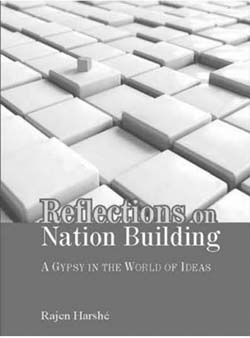The Gypsy in the World of Ideas by Rajen Harshe is a successful attempt at addressing the issues of Indian society, politics, intellectual history and institutions through the perspective that developed consequent upon Harshe’s longstanding experiences as an academician and institution builder. We can find here idea and praxis mixed together creating thoughtful reading for the readers. Breaking the conventional formats it ardently depends on the use of metaphors and poetic symbols. Metaphors here give a flight of imagination to express the accounts of social science issues. Broadening the horizons of explorations and research the unique amalgam of this innovative language gives a new meaning to social observations with creative insights. The term ‘gypsy’ is the base metaphor in the book that denotes breaking fixity of any type, continuous rupture of dominance and each moment’s search for novelty. This rupturing of fixity is symbolized in breaking the rigidities of given structures, be it place, distance and knowledge. If Indian contemporary writings on social sciences incorporate this essence of the ‘gypsy’, the very trajectory of social science writings will be different. Most of the metaphors reinvented by Harshe in his books find their reference to his creative and theoretically conscious readings of Marathi poems. Through his use of metaphors ‘gypsy’, ‘wall’ and ‘phoenix’ he transcends positivist empirical meaning of social realities and derives much broader meaning of these social processes.
Virtually these metaphors emerged and developed with an amalgam of theoretical consciousness and poetic imagination. The author describes the multi-layeredness of our society but simultaneously addresses the points of similarity between them that eventually transform from micro knowledge to form macro knowledge. With inherent power of interconnection, metaphors very candidly describe the social realties in a macro frame. ‘Metaphor always works within the tense area within which forces of similarity and difference collide and aligns itself with those of similarity.’
Harshe had a rich and eventful career as a teacher, administrator and institution builder with a wide range of experiences spanning many places like Pune, Delhi, Paris, Hyderabad, New York and Allahabad. His personal narratives stem from his experience at the University of Hyderabad and his association at the Allahabad University. A Gypsy in the World of Ideas is a memorable account of Harshe’s reflection on men, matters and institutions in tune with his flights and movements in the world of ideas ranging from poetry and philosophy on one hand to politics and education on the other. He explores a wide range of contemporary issues of socio-political concern like the Naxalite movement, insurgency in the North East, the Partition of India, alienation of youth, the university system, inspirational role of leaders like Gandhi, Tilak, Nehru and Mandela, metaphysical essences of life and society, sensitivity towards traumatic events and processes in history, the human quest towards institution/nation building, the Berlin Wall and the globalized economy. Harshe also looks closely at history with its myriad meanings and examines the nature of the past and the problems inherent in the writing of this discipline.

